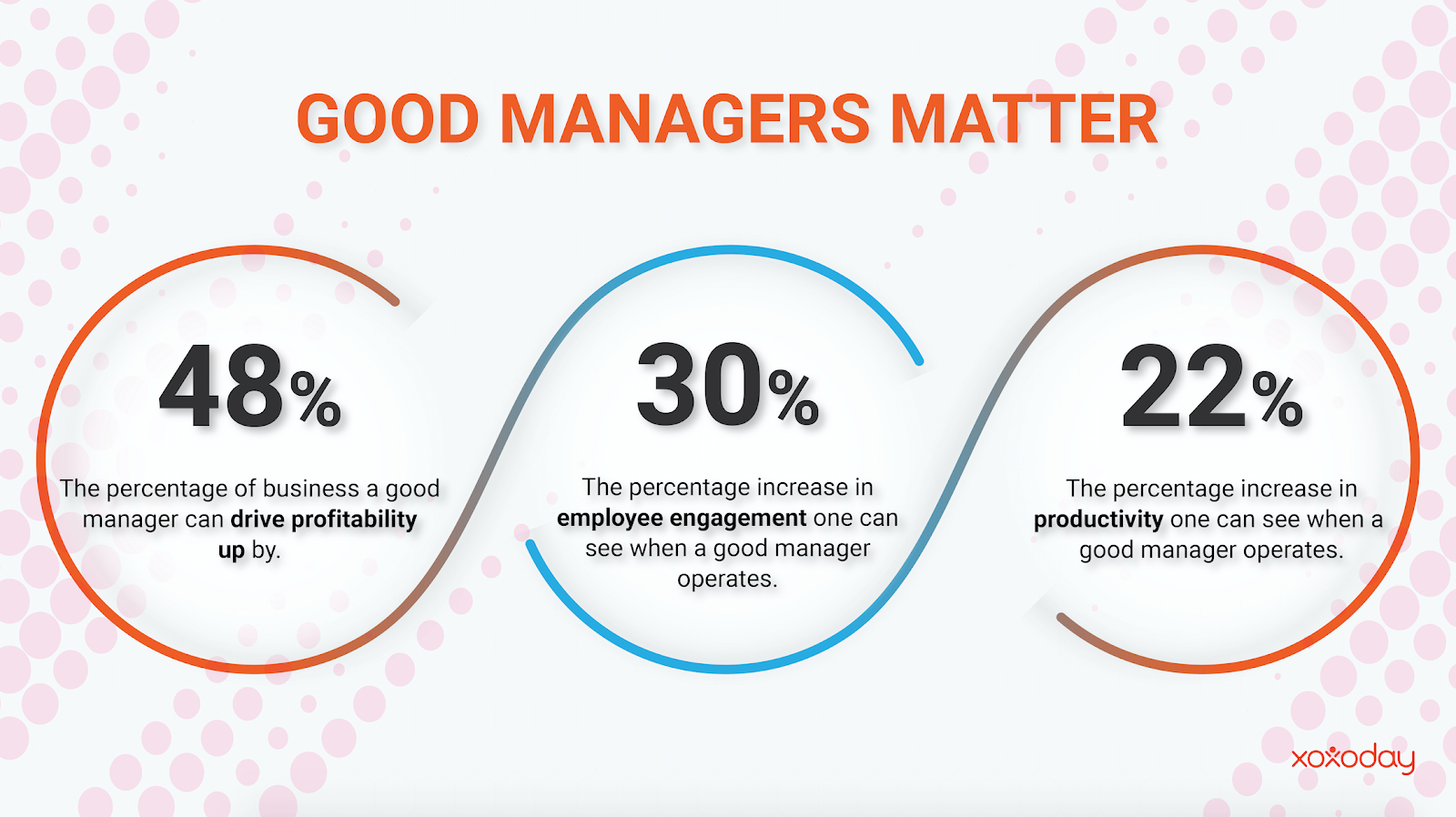How to Be Effective Managers in 2025: Characteristics, Strategies & Tools for Success
Master how to be effective managers with insights into leadership traits, employee engagement techniques, and AI-powered tools that drive team success in 2025.
En esta página
Aunque los rasgos esenciales de un directivo eficaz siguen siendo los mismos, un directivo debe demostrar unas dotes de liderazgo excepcionales en diversos campos para demostrar su valía. Escuchar lo que dicen los empleados y dedicar tiempo a comprenderlos se han añadido a las exigencias del puesto.
Los directivos que se ponen el sombrero de líder tienen el poder de incorporar estratégicamente los puntos fuertes de cada empleado al tiempo que se centran en el bienestar de los miembros del equipo para construir una gestión y delegación satisfactorias de las tareas de un proyecto.

Esto dice mucho sobre el papel esencial e insustituible de un gestor. En pocas palabras, una empresa tiene mucho que ganar con un gestor eficaz.
Características de un gestor eficaz
Los directivos pueden ayudar a sacar lo mejor de sus empleados. Pero, ¿qué hace que un directivo excepcional sea tan excepcional en comparación con un directivo medio? He aquí el qué.
1. Acepta la individualidad de cada empleado
En el libro de Marcus Buckingham, The One Thing You Need to Know: About Great Managing, Great Leading, and Sustained Individual Success, habla de la individualidad de los empleados y de cómo el reconocimiento de las capacidades únicas de éstos puede ayudar a que incluso los establecimientos que fracasan se eleven.
Los directivos medios intentan que todos los empleados caminen por el mismo camino estableciendo expectativas claras para alcanzar el objetivo que se pretende. Esto tiene sus ramificaciones.
Todos los empleados no disfrutan ni odian las mismas cosas, por lo que, aunque en algunos casos esto puede suponer un éxito a corto plazo, no es un plan a largo plazo que vaya a funcionar siempre. Cada empleado tiene sus puntos fuertes y débiles.
Un directivo eficaz sabe que cada empleado es diferente y se tomará el tiempo necesario para entender las diferencias de cada uno de ellos. Si el directivo no lo hace, puede estar asignando tareas a un determinado empleado que no solo detesta, sino que está bajando su rendimiento.
Un directivo competente se tomará el tiempo necesario para comprender a sus propios empleados antes de asignarles funciones.
2. Se centra en los puntos fuertes del empleado
Un directivo eficaz sabe que los puntos fuertes y débiles no son algo en lo que un empleado sea bueno o malo respectivamente. En cambio, el punto fuerte de los empleados es lo que les hace ilusión y lo que les agota.
El enfoque tradicional de los puntos fuertes y débiles no es eficaz y, en algunos casos, ha llegado a ser poco práctico. Un directivo medio se fija en lo que una persona no es buena y en lo que sí lo es e intenta mejorar lo malo con la esperanza de que el empleado se transforme mágicamente. Aunque este enfoque puede sonar muy bien en teoría, no es lo que impulsa el rendimiento de los empleados.

Eso dice mucho y un buen director lo sabe. Comprende los puntos fuertes y los aprovecha para que cada empleado pueda brillar. Y esto comienza con la observación.
La observación puede ser de dos tipos. Un directivo motivado observa a los empleados y toma nota mentalmente de cómo se comportan en diferentes escenarios. En segundo lugar, está dispuesto a hacer las preguntas adecuadas, específicas y directas.
Las investigaciones de Albert Bandura demuestran que la clave está en la seguridad en uno mismo, más que en la conciencia de sí mismo. Los directivos deben mantener esta mentalidad para animar a los empleados a alcanzar todo su potencial.
Pero, ¿qué pasa si un empleado no cumple? Los directivos saben que no basta con hacer la vista gorda ante los errores. En lugar de exagerar el problema, los directivos excepcionales intentan hacer algo al respecto y se comunican claramente con los empleados.
O bien piden al empleado que reciba la formación adecuada si carece de alguna habilidad necesaria para una tarea concreta. Esto ayuda a salvar la brecha y permite que el empleado se sienta seguro de sí mismo.
Sin embargo, en la mayoría de los casos, si las habilidades no son el problema, el directivo puede poner al empleado con una persona que destaque donde el primer empleado tiene problemas. Esto puede ser una experiencia de aprendizaje y desarrollo para el empleado.
3. Concienciación sobre el reconocimiento de los empleados
Un directivo extraordinario sabe que el reconocimiento es clave para recompensar a un empleado por su rendimiento ejemplar. Pero también es consciente de que cada empleado es único y que a cada uno de ellos le gusta recibir el reconocimiento de diferentes maneras.
Un directivo eficaz sabe que a su última contratación le encanta recibir reconocimiento delante de sus compañeros. También sabe que al hombre con tres décadas de experiencia que trabaja diligentemente en su mesa le encanta que le reconozcan en persona.
Un directivo conoce la importancia y el efecto del reconocimiento. Aunque la forma de obtener el reconocimiento puede ser completamente diferente de unos a otros, el reconocimiento es el mismo en todos los casos.
El reconocimiento infunde una sensación de logro y empuja a los empleados a trabajar más y mejor porque se les ha reconocido su buen hacer. Los directivos, que destacan en su labor, aprovechan la oportunidad para saber qué desencadena cada persona y cómo le gusta a cada empleado ser premiado.
El reconocimiento puede hacer que un empleado brille o se rinda. Los grandes directivos conocen los factores desencadenantes y se toman el tiempo necesario para aprenderlos porque son muy importantes para sus empleados. Cuando los directivos reconocen a los empleados de una forma que les hace más felices, puede hacer maravillas para el empleado y la empresa.
According to a Gallup study, an employee who isn't recognized at work is two times more likely to quit. Imagine losing out on the best employees just because they weren't recognized.
Effective managers know that and they will take every opportunity to ensure employees understand they are getting the recognition they deserve.
4. No se limita a oír, sino que escucha atentamente
Los directivos con éxito escuchan lo que dicen sus empleados. No les interesa simplemente oír, sino escuchar.
Hay una diferencia entre ambas cosas y Richard Mullender, fundador del Instituto de la Escucha, lo explica con precisión. Dice que escuchar no es solo oír lo que la otra persona dice, sino intentar descubrir la razón de lo que dice y analizar la forma en que lo dice.
Active listening lets managers truly understand what is happening in their employees' minds. And he doesn't believe that body language is that important because that can be misleading and distracting.
What sets a brilliant manager apart from an average manager is the ability to truly listen and be quiet when the employees are talking. They know interruption or correction while the employee speaks is uncalled for.
El directivo no debe hacer demasiadas preguntas sin escuchar todo lo que el empleado tiene que decir. Esto puede distraer e impedir que el empleado hable libremente con el directivo.
Como el año pasado ha sido duro para todos los empleados, un directivo eficaz debe escuchar con atención y sinceridad. De este modo, el directivo puede comunicar de forma eficaz el motivo por el que el empleado se siente de una forma determinada.
En 2024, escuchar será decisivo para las empresas. Los directivos necesitan conocer las opiniones de sus empleados para comprenderlos mejor. Esto puede ayudar a construir una relación en la que ambos puedan beneficiarse y hacer que a la empresa le vaya bien.
6 strategies to be an effective manager
We have shared 6 working strategies on how to be an effective manager. Let’s mull this down.
1. Builds trust through transparency
A successful manager creates trust by being transparent. Transparency shows that the manager values honesty, which helps employees feel safe and included.
A 2019 Edelman Trust Barometer report showed that 76% of employees trust their employer more when leadership is transparent. Transparency builds alignment and enhances collaboration.
For instance, instead of hiding upcoming changes, a manager can communicate them early and explain the reasoning. This allows the team to adjust and offer input.
A transparent culture doesn’t just make employees feel included—it drives performance and reduces turnover.
How can Empuls help?
Empuls’ social intranet and townhall tools empower managers to:
- Share updates, wins, and policy changes.
- Use polls, AMAs, and community groups to drive open dialogue.
- Pin important posts for transparency and alignment. ✅ Supports strategy: “Builds trust through transparency”
2. Delegates with clarity and purpose
Delegation is key to understanding how to be an effective manager. It’s more than assigning tasks—it’s empowering employees to take ownership.
According to Gallup, companies that promote employee ownership experience 21% greater profitability and 17% higher productivity.
A manager should not just say, “Finish this report.” Instead, they should clarify, “I’d like you to lead this report because of your strong analytical skills. Your insights can help shape our upcoming pitch.”
Delegating with intention fuels motivation, builds leadership skills, and reduces burnout for managers.
How can Empuls help?
Empuls helps set up intelligent nudges that:
- Encourage timely delegation.
- Suggest recognition when key milestones are hit.
- Guide managers to loop in the right people based on insights. ✅ Supports: “Delegates with clarity and purpose”
3. Gives consistent and constructive feedback
An effective manager provides feedback regularly—not just during annual reviews. Feedback should be timely, specific, and focused on behavior, not personal traits.
A study by Forbes found that 65% of employees want more feedback, and four out of ten disengaged employees say they get little to no feedback at work.
Constructive feedback might sound like: “Your presentation had strong insights, but let's work on improving the structure to make it easier for the client to follow.”
Regular feedback builds trust, encourages growth, and reinforces a culture of accountability.
How can Empuls help?
Empuls automates:
- Work anniversaries, birthdays, and service awards.
- Messages, certificates, and reward deliveries—all branded and tax-compliant. Supports: “Invests in self-development” by freeing up time for strategic work
4. Invests in self-development
To be an effective manager, constant learning is essential. Leadership trends, business tools, and communication strategies are evolving rapidly.
According to Harvard Business Review, 90% of executives say leadership development is a high priority, yet only 40% believe their managers are ready for the challenges ahead.
Effective managers seek growth through books, online courses, peer networks, or executive coaching. They reflect on mistakes and seek feedback.
When managers invest in themselves, they set an example for the entire team and foster a culture of learning.
How can Empuls help?
Empuls helps align team goals with company vision through:
- Vision-aligned recognition programs.
- Culture dashboards showing how each person contributes.
- Integration with tools like MS Teams, HRMS, and SSO.
- Supports: “Encourages autonomy and aligns goals with vision”
6. Encourages autonomy and ownership
Micromanagement stifles innovation and morale. A 2018 survey by Trinity Solutions found that 69% of employees considered changing jobs due to micromanagement.
Successful managers give employees room to make decisions and own their tasks. Autonomy builds confidence and encourages problem-solving.
For example, instead of telling an employee exactly how to run a campaign, the manager could say, “Here’s the goal. I trust your judgment to get us there.”
Giving employees ownership of their work inspires creativity, loyalty, and better results.
How can Empuls help?
Empuls promotes autonomy through:
- Personalized nudges by Em, the AI assistant, encouraging initiative and self-recognition.
- Peer-to-peer and team recognition systems that highlight individual contributions.
- Group collaboration tools (like community groups) for independent knowledge-sharing.
- Feedback surveys to gauge how empowered employees feel.
- Supports strategy: “Encourages autonomy and ownership”
6. Aligns team goals with company vision
Employees want to know how their work contributes to the bigger picture. A McKinsey study revealed that employees who find their work meaningful are 33% more engaged and 75% more committed to the organization.
An effective manager connects the dots between day-to-day tasks and broader company goals. This helps employees understand the impact of their work and feel more motivated.
Clear alignment builds direction, reduces ambiguity, and turns employees into mission-driven contributors.
How can Empuls help?
Empuls fosters alignment through:
- Culture dashboards that map contributions to company values.
- Regular updates and townhalls via the social intranet to reinforce mission and vision.
- Recognition tied to core values and organizational goals.
- Goal clarity tools through survey feedback and people analytics.
- Supports strategy: “Aligns team goals with company vision”
Conclusión
A manager's duty was never a simple one to begin with, but being an effective manager in 2025 will be even more difficult. As more challenges are thrown her way, it is up to her to use every opportunity she gets.
The manager should be capable of getting the best out of every employee while allowing each employee to learn and grow.
Being an effective manager in 2024 is about more than just delegation or performance tracking—it's about connection, recognition, and impact. This is exactly where Empuls steps in.
Empuls is an AI-powered employee engagement platform designed to equip managers with the tools they need to lead with empathy, data, and purpose.
Whether it’s understanding team sentiment, celebrating milestones, or reinforcing company culture, Empuls transforms people managers into powerful drivers of employee happiness and business performance. Here’s how Empuls enables effective management:
- Connect & align: Keep teams in sync with a social intranet that fuels transparency, culture, and community—no matter where employees are.
- Listen & act: Deploy eNPS, pulse, and lifecycle surveys to gather honest feedback and use real-time analytics to make informed decisions.
- Recognize & reward: Give managers automated nudges to recognize achievements, run structured R&R programs, and celebrate big and small wins.
- Drive performance: With smart dashboards and insights, managers can spot recognition gaps, engage quieter team members, and boost morale.
- Motivate with meaningful rewards: From global gift cards to personalized experiences and branded swag, reward your team with what truly matters to them.
Want to build more effective managers? Give them Empuls—a platform that does the heavy lifting so they can focus on what matters: people.
👉 Book a free demo of Empuls
👉 Or explore more at www.empuls.io
Preguntas frecuentes
1. What are the 5 C's of management?
The 5 C's of management represent key traits for effective leadership:
- Clarity – Clear vision, goals, and communication.
- Confidence – Belief in self and team decisions.
- Commitment – Dedication to team and company success.
- Consistency – Fair, reliable, and predictable actions.
- Compassion – Empathy toward employees’ well-being.
2. How can a manager be more effective?
A manager becomes more effective by:
- Understanding individual strengths and assigning roles accordingly.
- Listening actively to feedback and team concerns.
- Providing regular recognition and constructive feedback.
- Delegating with purpose and fostering autonomy.
- Aligning team goals with the company’s vision. Empuls can help by offering AI-powered insights, automated recognition, and communication tools to support all of these efforts.
3. What are the 7 capabilities of a good manager?
A good manager typically demonstrates:
- Strategic thinking
- Comunicación eficaz
- Team leadership
- Emotional intelligence
- Decision-making
- Gestión del rendimiento
- Adaptability to change
These capabilities ensure a manager can drive both people and performance forward successfully.












